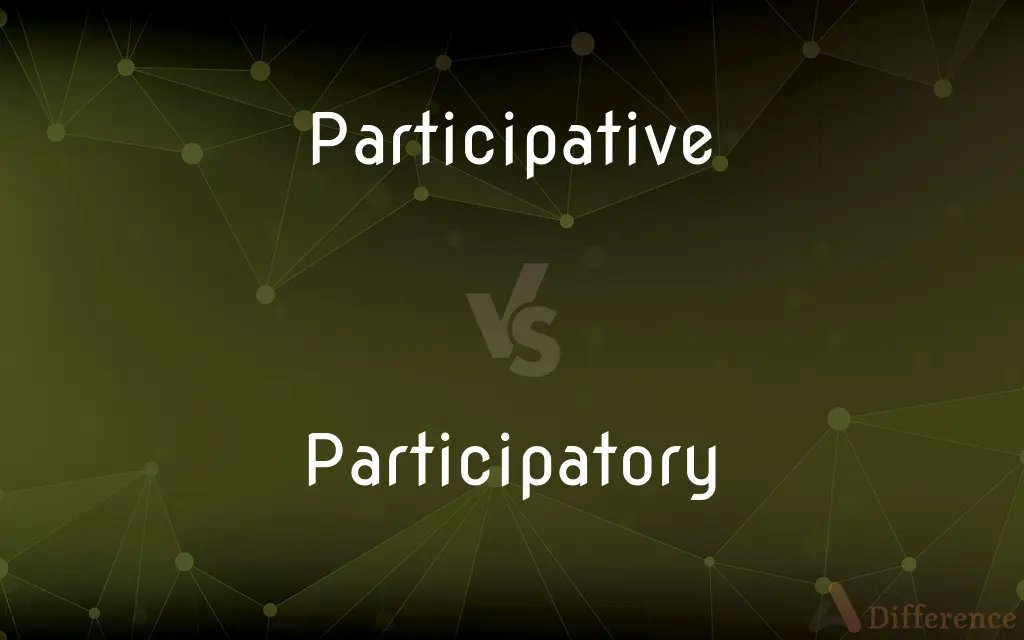Participative vs. Participatory — What's the Difference?
Edited by Tayyaba Rehman — By Fiza Rafique — Updated on April 19, 2024
Participative management involves employee input in decision-making, while participatory approaches focus on broader involvement in processes.

Difference Between Participative and Participatory
Table of Contents
ADVERTISEMENT
Key Differences
Participative management often implies employees are actively involved in decision-making processes within an organization, aiming to improve engagement and morale. On the other hand, participatory approaches are used in a wider variety of contexts, including community projects, where the emphasis is on involving all relevant stakeholders in the decision-making process.
In participative systems, the focus is primarily on involving employees in shaping decisions that affect their work directly. Whereas in participatory systems, the involvement can extend to external stakeholders, such as community members or users of a service, reflecting a more comprehensive engagement strategy.
Participative methods are frequently associated with internal business practices, where managers seek input from their teams to make informed decisions. In contrast, participatory methods are often linked with social, educational, or developmental projects aimed at fostering wider community cooperation and input.
Implementation of participative techniques typically occurs within the hierarchical structure of an organization, ensuring that employee contributions are filtered through managerial perspectives. Conversely, participatory techniques strive for a more egalitarian approach where each participant's voice has equal weight, regardless of their organizational or social standing.
The outcomes of participative approaches are usually specific to organizational improvements or business outcomes. Meanwhile, participatory approaches often aim for broader societal impacts, such as increased community cohesion or enhanced public services.
ADVERTISEMENT
Comparison Chart
Scope
Internal to an organization
Broad, including community
Key Focus
Decision-making
Inclusive process
Typical Users
Employees
Community members, stakeholders
Hierarchical Context
Often maintained
Egalitarian
Outcomes
Organizational improvement
Societal or community impact
Compare with Definitions
Participative
Refers to a style of management focusing on employee involvement.
The new director is known for his participative leadership style.
Participatory
Emphasizing the involvement of all relevant stakeholders.
The city's participatory budgeting process engages residents in allocating municipal funds.
Participative
Involving or characterized by participation.
A participative workshop allowed every employee to share their ideas.
Participatory
Aims at equality in the involvement of participants.
The workshop was designed to be fully participatory, giving everyone an equal voice.
Participative
Related to engaging people within a specific group or organization.
Participative meetings ensure all team members can contribute to project discussions.
Participatory
Often used in contexts of community engagement and social projects.
Participatory research methods were adopted to better understand community needs.
Participative
Designed to encourage and consider input from others.
The company's participative decision-making process helped in identifying the best solutions.
Participatory
Focuses on collective contributions and benefits.
Participatory approaches in urban planning foster greater community satisfaction.
Participative
Employed mainly within corporate or organizational settings.
Participative techniques have boosted morale and productivity at our workplace.
Participatory
Pertaining to the concept of taking part in an activity or event.
Participatory design involves users throughout the development process.
Participative
To be active or involved in something; take part
Participated in the festivities.
Participatory
Marked by, requiring, or involving participation, especially affording the opportunity for individual participation
A participatory democracy.
Participative
To share in something
If only I could participate in your good fortune.
Participatory
Relating to participation.
Participatory behavior
Participative
That participates, or is capable of participating
Participatory
Open to participation.
Participative
Capable of participating.
Participatory
Affording the opportunity for individual participation; as, participatory democracy.
Participatory
Affording the opportunity for individual participation;
Participatory democracy
Common Curiosities
How do participatory approaches benefit a community?
They enhance community engagement, ensure diverse input, and often lead to decisions that reflect the community's collective interests.
How can organizations transition from participative to participatory methods?
Organizations can expand the scope of engagement by including more stakeholders and adopting more egalitarian approaches in their decision-making processes.
What is the primary difference between participative and participatory?
Participative focuses on employee involvement within an organization, whereas participatory involves broader stakeholder engagement.
What roles do employees typically play in participative management?
In participative management, employees are often involved in contributing ideas, suggestions, and feedback, which are considered by management during the decision-making process.
Can participative methods be used in community projects?
While primarily corporate, participative methods can be adapted to community settings, though participatory methods are more common.
Are participative approaches less effective than participatory?
Not necessarily; participative approaches are effective within their scope but might not capture the broader engagement of participatory methods.
Can participative and participatory methods be integrated within the same project?
Yes, it's possible to integrate both methods in a project. For example, a company might use participative methods internally while employing participatory methods to engage with external stakeholders like the local community or interest groups.
What kinds of projects are best suited for participatory approaches?
Participatory approaches are well-suited for projects that require community buy-in and diverse input, such as urban planning, public health initiatives, and educational reforms.
How do participative and participatory approaches impact decision-making speed?
Participative approaches may speed up decision-making within an organization by leveraging employee insights, whereas participatory approaches might slow down the process due to the broader range of stakeholders involved.
What are the main challenges of implementing participatory approaches?
Key challenges include managing diverse opinions, ensuring all voices are heard equally, logistical complexities of wider engagement, and potential conflicts that may arise from differing stakeholder interests.
Share Your Discovery

Previous Comparison
Teller vs. Cashier
Next Comparison
Concur vs. EndorseAuthor Spotlight
Written by
Fiza RafiqueFiza Rafique is a skilled content writer at AskDifference.com, where she meticulously refines and enhances written pieces. Drawing from her vast editorial expertise, Fiza ensures clarity, accuracy, and precision in every article. Passionate about language, she continually seeks to elevate the quality of content for readers worldwide.
Edited by
Tayyaba RehmanTayyaba Rehman is a distinguished writer, currently serving as a primary contributor to askdifference.com. As a researcher in semantics and etymology, Tayyaba's passion for the complexity of languages and their distinctions has found a perfect home on the platform. Tayyaba delves into the intricacies of language, distinguishing between commonly confused words and phrases, thereby providing clarity for readers worldwide.
















































